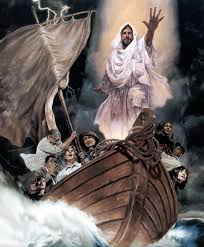The trade unions are planning a massive day of protest in March against the government austerity cuts. In a modern democracy no one believes in blind obedience to the Government and that's why we have freedom of speech. If you disagree with the ruling political party or coalition there are ways to make your views heard in a legitimate manner. Peaceful protests are legitimate. However, a certain modicum of allegiance is called for so there isn't anarchy on the streets every time a new law is passed. This, in turn, made me ponder on the question of whether or not there is a tension in the Christian faith between obedience and resistance? The former is so much a part of our Christian teaching as in 'submit yourselves to...'
This seems, at first glance, to be backed up by scripture. Hebrews 13:17: ' Have confidence in your leaders and submit to their authority, because they keep watch over you as those who must give an account. Do this so that their work will be a joy, not a burden, for that would be of no benefit to you.'
Does this passage require unquestioning obedience? I actually don't think so because inherent in the words '...as those who must give an account ' is the understanding that no one is above God's word and justice is part of that equation. Governments must adhere to democratic principles in the same way. So where does this leave us?
Christianity isn't just a private faith practised within one's narrow sphere of life. Christianity is a community based religion. We care about the homeless, the deprived and the sick for that was the example set by Jesus alone. This Christian notion of care, I firmly believe, requires us to question any injustice that we perceive as being done to our fellow men and women using the Christian principles of justice-negotiation and peace. We cannot be unquestioningly sheep like. If Jesus had followed blindly the law of the land he would have surrendered to Caesar and declared himself 'not to be King'.
However, not every call to strike is an expression of a response to an injustice. There are different political opinions within our diverse society and it is up to each individual Christian to decide whether or not a cause is worth taking up. This is a subset of my overall claim, though, that Christians can speak up.
This seems, at first glance, to be backed up by scripture. Hebrews 13:17: ' Have confidence in your leaders and submit to their authority, because they keep watch over you as those who must give an account. Do this so that their work will be a joy, not a burden, for that would be of no benefit to you.'
Does this passage require unquestioning obedience? I actually don't think so because inherent in the words '...as those who must give an account ' is the understanding that no one is above God's word and justice is part of that equation. Governments must adhere to democratic principles in the same way. So where does this leave us?
Christianity isn't just a private faith practised within one's narrow sphere of life. Christianity is a community based religion. We care about the homeless, the deprived and the sick for that was the example set by Jesus alone. This Christian notion of care, I firmly believe, requires us to question any injustice that we perceive as being done to our fellow men and women using the Christian principles of justice-negotiation and peace. We cannot be unquestioningly sheep like. If Jesus had followed blindly the law of the land he would have surrendered to Caesar and declared himself 'not to be King'.
However, not every call to strike is an expression of a response to an injustice. There are different political opinions within our diverse society and it is up to each individual Christian to decide whether or not a cause is worth taking up. This is a subset of my overall claim, though, that Christians can speak up.












